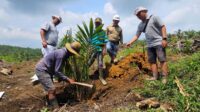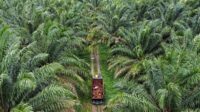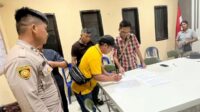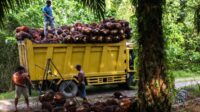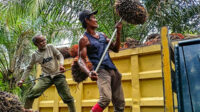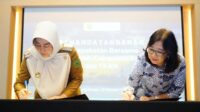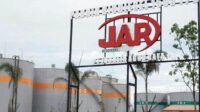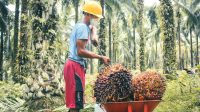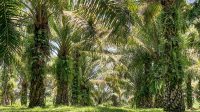PALMOILMAGAZINE, SOLO, INDONESIA – A two-day workshop in Solo’s historic Kampoeng Batik Laweyan brought together five participants from Malaysia to explore an innovative approach to sustainable batik production: palm-based batik wax. Held from 28–29 July 2025, the event was organized by the Forum Pengembangan Kampoeng Batik Laweyan (FPKBL) with support from the Roundtable on Sustainable Palm Oil (RSPO), serving as a platform for regional knowledge exchange.
The workshop introduced Malaysian batik artisans and creative professionals to an alternative wax made from stearin—a derivative of certified sustainable palm oil. This eco-friendlier alternative to traditional petroleum-based wax not only reduces environmental impact but also promotes responsible sourcing practices across Southeast Asia.
“This is more than just a technical training,” said Alpha Febela Priyatmono, Chairperson of FPKBL. “It’s a meaningful cultural and professional exchange between two nations that share a rich textile heritage. We hope this knowledge-sharing initiative encourages future collaborations and greater awareness of sustainable materials within our industries,” Alpha said, as quoted by beige-heron-208544.hostingersite.com in a statement.
Also Read: Palm-Based Batik by FPKBL Showcased at Adi Sumarmo Airport, Solo
Since 2022, FPKBL has collaborated with RSPO to develop and apply palm-based wax in batik production. The initiative reflects a broader vision: to align Indonesia’s cultural heritage industries with modern sustainability values. As part of its commitment, FPKBL is currently undergoing the RSPO certification process, aiming to be the first batik-based entity to integrate certified sustainable palm oil practices into its operations.
Dr. M Windrawan Inantha, Deputy Director of Market Transformation RSPO Indonesia, emphasized the importance of regional cooperation in advancing innovation.
“What we’re seeing here is a practical demonstration of how sustainable palm oil can be part of local creative economies. The fact that professionals from Malaysia are coming to Solo to learn about this wax signals strong regional interest and perhaps even demand. We see similar potential in countries like Thailand, where traditional textile craftsmanship also thrives.”
Participants explored the full process of using palm-based wax, from raw material to finished batik, guided by master artisans in Laweyan. They also discussed potential applications and scalability in their respective contexts.
The event underscores the growing relevance of sustainability not only in agriculture and manufacturing, but also in the creative sector. As global and regional consumers become more discerning about the origins and environmental impact of what they wear and use, innovations like palm-based batik wax offer new possibilities for tradition-based industries to evolve responsibly.
This workshop marks a step forward in building a Southeast Asian network of sustainable batik, uniting heritage, innovation, and shared environmental responsibility. (P3)






